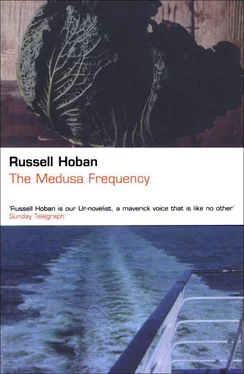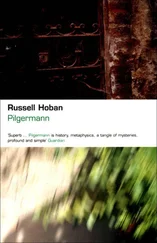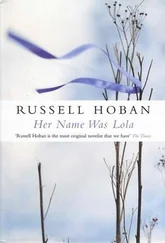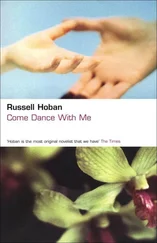Closer and closer came the face of Eurydice, her mouth open and grinning, her tongue hanging out. Larger and larger grew her face, widening in my vision until I saw it all around me, this great and loosely grinning face of the Vermeer girl and Melanie Falsepercy and Luise becoming, becoming… Who were they becoming?
‘Luise,’ I said, ‘Luise, Luise.’
‘I used to know a Louisa,’ said the man on my right as the sunlit sea slid past the window. LANCASTER GATE appeared and was gone. He had an unsure look and was wearing a broken-brimmed hat.
‘How do you spell it?’ I said.
He pulled up his jacket sleeve and his shirt sleeve and showed me a tattoo on his forearm, a snake twined around a dagger. On a little banner above it was the name Louisa. ‘Like that,’ he said.
‘Not the same,’ I said. ‘Why the snake and the dagger?’
‘Symbolic.’
‘Of what?’
‘I don’t know, I was drunk when I had it done.’
‘Where’s Louisa now?’
‘No idea, no idea at all. Snows of yesteryear. She may have become a lion-tamer, she may have joined the Navy. You break out of the bin?’
‘Why? Do I look like a loony?’
‘Look like you been plugged into the wall or something.’
It was then that I became aware of the wires trailing from the electrodes on my head. I unwired myself and was going to put everything into the pocket of my anorak but I wasn’t wearing my anorak and now that I noticed it I was cold. I stuffed the wires and the electrodes into a trouser pocket.
‘You been getting some kind of ECT,’ he said. ‘They done that to me, they said the voices would go away.’
‘Did they?’
‘Yes. Now I’ve got nothing. There’s only a kind of ringing emptiness. I never asked them to take away the voices but there it is, you see: who am I? Nobody. I’m not entitled to hear voices unless it’s somebody asking me questions and taking down what I say. You showed them though, you just walked away wires and all. Don’t let them empty you out, they’ve got nothing better to offer. Best of luck to you is what I say.’ He shook my hand warmly and gave me a thumbs-up sign when I got off at Notting Hill Gate.
When I was alone the sea came back to me again, I could feel the running of the tide as I went up the escalators, through the corridor and up the stairs to the District and Circle Line platforms. Everything seemed much darker than it ought to be. I went to the end of the platform where I always wait for the Wimbledon train and stood looking at a narrow vertical sign that said A162, a light that showed sometimes red and sometimes green, and a distorting mirror. In the mirror the tracks rippled as if straightness were not the truth of the black tunnels. The unseen olive tree and the sea flickered their sunlight in the November dark.
A bright stillness approached, on the front of it the illuminated word WIMBLEDON. Listening to the sea I entered it, was borne home through November dark and moving lights, poured myself a large gin, was very tired, took the phone off the hook, fell asleep on the couch.
It was between six and seven in the morning. The moon was low in the sky. It was a waxing moon, a gibbous one; it was a particular moon. I raised the window-blind. The pinky-orange hibiscus street lamp outside the window was the same as always. I opened the front door and went out into the foredawn, into the hissing of the silence and the humming of the underground trains standing empty with lighted windows on the far side of the common. Unseen birds twittered but there was no crow to shout and flaunt its blackness.
I heard my footsteps; I saw under the lamps my shadow first before me, then behind. ‘Nothing to declare,’ I said.
I crossed the common and headed down the New King’s Road. The Belisha beacons clicked as they blinked in the coldness of the morning. Cars at intervals hissed past me, in each one a face as questionable as the faces printed on the tin windows of toy cars from Japan. The shops stood like sleeping horses.
The lamps on Putney Bridge were still lit, the bridge stood in simple astonishment over the water, a stonelike creature of overness, of parapets and ghostly pale cool tones of blue, of grey, of dim whiteness in the foredawn with its lamps lit against a sky growing light. Far below lay the river; slack-water it was, turn of the tide, the low-tide river narrow between expanses of mud, the moored boats rocking on the stillness.
A sort of singing filled my head; it seemed an aspect of the particles of light and colour that made in my eyes the picture of this time just before dawn. I thought of the dew on the grass where the olive tree stood. There seemed to be a question in the air.
‘Yes,’ I said, ‘I will.’ I spoke aloud because I wanted my answer to be recorded on the early air.
I was walking on the Putney side of the river, walking on the low-tide beach, hearing the lapping of the water on the stones. I was seeing the moon-glints on the water, I was smelling the low-tide smell of the mud and the stones by the river.
The singing in my head became the slowly spreading circles of an intolerable clangour; it was as if the brute bell of the universe were caged in my mind and bursting my skull. ‘Eurydice!’ whispered a voice from the mud, from the stones. ‘Eurydice!’
5 The Head of Orpheus Begins Its Story
It was an eyeless and bloated human head, sodden, covered with green slime and heavy with barnacles. I took it in my hands; where the flesh had been eaten away I could feel the ancient skull.
I could feel the head humming and buzzing in my hands, then it began to speak. Its voice was more elemental, more profound than human voices are; the way it spoke seemed more animal than human; it was as if speech had suddenly become possible for an animal, as if the creature were for the first time putting thoughts into words. ‘Who are you?’ said the head.
‘Nobody, really. Nobody you’d know.’
‘You wouldn’t be seeing me if I didn’t know you. What’s your name?’
I didn’t want to tell it my name.
‘Speak up,’ said the head. ‘What are you afraid of?’
‘Everything.’
‘No you aren’t, you came to the river and you said, “Yes, I will.’”
‘I don’t know why I said that.’
‘Tell me your name.’
‘Herman Orff.’
‘Is that really your name?’
‘Yes, it really is.’
‘Do you know who I am?’
‘No. Who are you?’
‘I’m the head of Orpheus.’
‘How do you do.’
‘You sound as if you don’t believe me.’
‘Why aren’t you speaking Greek?’
‘The words that I’m speaking are what I find in your mind. Is there any Greek there?’
‘No.’
‘That’s why I’m not speaking Greek.’
‘Oh yes.’
‘You still don’t believe me. Do you want me to sing for you?’
‘All right, sing for me.’
The head opened its mouth, its lips and tongue moved, I félt it vibrate in my hands but I heard nothing. After a long time the vibration stopped. ‘Well?’ said the head.
‘I didn’t hear anything.’
The head began to weep, it shook in my hands with great wild racking sobs. After a while it quieted down.
‘Look,’ I said, ‘it’s all right, I believe you without the singing.’
‘You don’t believe me the way I want you to believe me, I can hear it in your voice — you don’t believe I’m the real head of Orpheus.’
‘In the first place I do believe you, and in the second place how much difference does it make if you aren’t the real head of Orpheus? I’m not sure I’m the real head of Herman Orff but I get up every morning and get on with it. You’re what you are and I’m what I am and let’s leave it at that.’
Читать дальше












